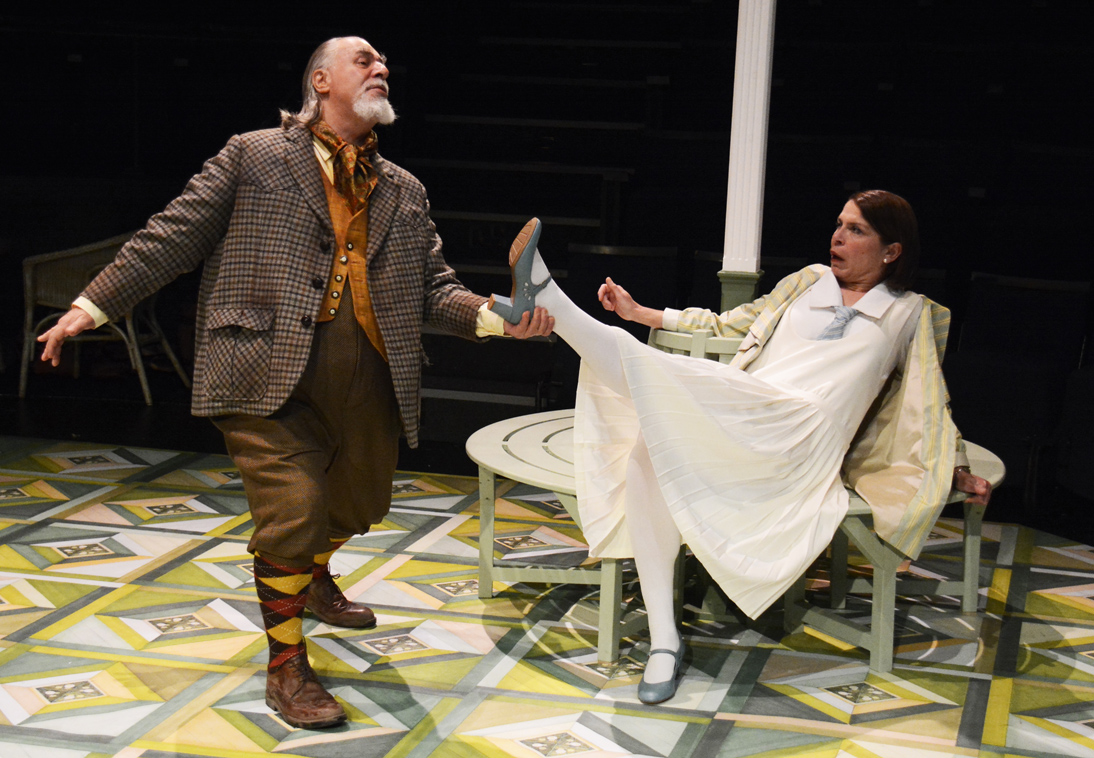
Barrie Rutter is an actor-manager of the old school and more power to his elbow for that. The mission statement of his company, Northern Broadsides, is that all the plays they do are set Up North and most of the characters are played with Yorkshire accents – and why not? There was no such thing as Received Pronunciation in Shakespeare’s time and no smooth vowelled BBC announcers to set the style.
So, “of Windsor” has been dropped from the title of the piece and the home counties are far to the south. The problem with re-locating Shakespeare’s plays is the references to the original place in the text – this was an issue I had with the current all-black Hamlet by the RSC. Mr Rutter has overcome this by dropping the Windsor and changing some names – the Fat Woman of Brentford becomes the Fat Woman of Ilkley, for example. I think this is a much better and more sensible policy rather than having us believe that Elsinore is somewhere in darkest Africa.
Sir John Falstaff is probably the Bard’s greatest comic creation and after playing a supporting character in Henry IV Pt 1, followed by a guest appearance in Pt 2 he now gets his own show. His farewell appearance is off-stage in Henry V. Mr Rutter’s Sir John is a very coarse and vulgar fellow for whom it is difficult to have much sympathy. His quest to woo two married women backfires and he finds himself in the proverbial. Played with tweeds and an enormous fat-suit – but with Rutter’s own long hair and beard – he is much the same boasting chancer that we first met in Eastcheap but is now, without royal patronage, rather down on his luck.
So, what of the production? It is played in the 1920s at, I guess, some sort of garden party – this is jolly hockey sticks, anyone for tennis Shakespeare. Everyone, with the exception of Falstaff and a Technicolor Slender, is in blazers, white flannels and toting golf-clubs, tennis rackets or . . . well, hockey sticks. I suppose the concept worked well enough but I found the production lacked colour, both literally and metaphorically. This was all whites, beiges and pastel shades with a set that consisted of not very successfully stylised trees and lots of dull drapes. Visually it was bland and rather disappointing and there were lots of ensemble scenes where the characters just seemed to be standing in a line across the stage. For me the production lacked any real energy or life and, consequently, on some occasions everyone seemed to be trying far too hard. That said, there were some good performances.
Mr Rutter was a very passable and acceptable Falstaff but lacked any endearing features and failed, I think, to garner much sympathy. I really liked Helen Sheals as the be-aproned, head-scarfed housewife Mistress Quickly but all eyes were on the slightly over the top Jos Vantyler, as the colourful and very camp Abraham Slender, who came close to up-staging everyone else when he was on.
The second half was much better than the first and the masque scene was nicely done. I think the move Up North did not hinder the play and demonstrated that if you are to make substantial changes to the location of a Shakespeare play it can be a good idea to tweak the text to accommodate it. While Northern Broadsides dropped the Windsor handle, it proved invaluable to some others we hold dear.
There was such anti-German feeling during the First World War that in 1917 the British royals changed their family name from Saxe-Coburg-Gotha to Windsor. Kaiser Wilhelm II was amused and apparently joked that he was off to see a performance of The Merry Wives of Saxe-Coburg-Gotha – now that would make an interesting interpretation. ★★★☆☆ Michael Hasted 20th April 2016

